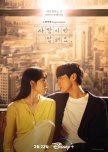
An uncommonly, almost tenderly told revenge story
"Call it Love" begins with a quote from a writer about love, followed by a voiceover radio announcer's summary: "To understand the loneliness of others, for me, that's the beginning of love." Beautiful, sensitive words... and at the same time: the grounding of this KDrama.There are so many lonely people out there (even if that doesn't necessarily mean they're alone). There are also those who recognize the other in their loneliness. Love in different facets swings back and forth between each episode - quietly, tenderly, unspoken, then also outspoken, sometimes here, sometimes there. In the case of Shim Woo-joo and Han Dong-jin, despite barriers love like determined water finds its way.
The KDrama offers no ´boom-squish´, no spectacle, yet slow food for the heart. So slow, that it almost touches the edge of the bearable at times. Watching the two protagonists moving through scenes is almost like in slow motion. The facial features are minimal, too. However, it´s nevertheless expressive and intense. Tender emotions are held back, an the next moment some razor-sharp thoughts are communicated without hesitation – Woo-joo is good at that. She embodies a sharp mix of disinterest and impulsiveness. Dong-jin, for his part, is the master of outward indifference and equanimity, enduring life´s challenges quietly and good-naturedly – almost stoically. But both are basically victims of their learned helplessness and of being overwhelmed with their extremely ambivalent feelings towards their own parents. ´She´ is still bitter because of her cheating father, who left the family for another woman. His burden is his exalted mother, who notoriously charms other people's husbands and lives a ´good life´ at their expense, with her son being in the way and left with the father.
A web of loving people are surrounding both Woo-joo and Dong-jin. So, even if they may feel alone with their feelings, they really aren't. Woo-joo's friend, the pharmacist Yoon-jun, feels a lot more for Woo-joo. Dong-jin's school friend and business partner knows his buddy like the back of his hand. Then there's Woo-joo's sister, who for her part is struggling with dating and finally just discovers her feelings for Yoon-jun. And suddenly Dong-jin's ex-fiancé is back, who left him without a word a year ago, went to the USA and is now suddenly back, being ready for the next step. ... Somehow everyone seems a bit lost and sometimes awkward in their emotional life, as well as in their (traditional) family liabilities. They might feel lonely. But they are actually not alone.
Technically speaking, the plot aims for something completely different than romantic love: revenge is the driving force of the story. There's Woo-joo on her vendetta against the woman who stole her father and secured the house as an inheritance – with the vendetta actually targeting the son, Dong-jin. Then there is Dong-jin's former boss, who wants revenge for Dong-jin resigning along with his childhood friend from school to start a rival business. And there's the age-old dynamic between Woo-joo's mother and her rival who stole her husband years ago...
Somehow like balm: here the revenge motive can't prevail in the end. Rather, a gentle template of compassion and forgiveness settles over resentment and bitterness. Like a silk scarf, this compassion covers the wounds and thus changes, rather widens, the perspective. "To understand the loneliness of others, for me that is the beginning of love." In the end the truth of these words is revolving about much more than 'just' romantic love – the heart empathically banging on another one´s wall, makes the wall come down and healing become possible.
Gaze, movement as well as camera angles are chosen with care. Like that more than once time is frozen, sort of. Often enough, this KDrama is deliberately so slow that you might want to give the protagonists a nudge here and there. Paradoxically, this perceived standstill envelops the actually quite dynamic story, which gains its drive from the revenge motive and knows very well how to come up with tension, too. This idiosyncratic mixture of dramatic events and moments of standstill, of revenge and honest love, results in a very unique, ambivalent, subtly burned-in dynamic and elusive fascination for this KDrama. Cupid interjects encouragingly and does it well. Actors and actresses also successfully correspond with authentic emotion.
Ultimately, an uncommonly, almost tenderly told revenge story.
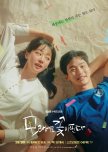
Sometimes grumpy & gruff, sometimes touchingly sweet & unabashedly sincere, radiating joy & warmth
“Like Flowers in Sand” is enchanting in its own way. Here we have once again a KDrama with a distinctive aura. Rustic, with tons of heart, original characters and great performance. Without tons of make-up, yet with plenty of bare male torsos - here, for a change, not focusing on aesthetic ideals… (which sort of makes this KDrama even more likeable and even more authentic.) Love also has a subtle hand in it here and conjures up a rather unconventional Rom+Com in the guise of a crime thriller.“Like Flowers in Sand” takes a look at the rural regions – with their living traditions, the lively gossip and the importance of lifelong childhood friendships. The way people interact with each other is a little rough, but still warm; sweet even, yet in a grumpy disguise.
The KDrama draws its significant charm from the tradition and lifestyle of the Ssireum wrestlers. The two protagonists grew up with Ssireum (see side note below). In general, Ssireum marks the dramaturgical pivot of the story - then and now.
The gym, the sand-filled wrestling field, the colorful ´satpas´, and the ML tirelessly running here and there and back again, all of this contributes to an unmistakable look&feel. In addition, "Like Flowers in Sand" is sometimes grumpy and gruff, sometimes touchingly sweet and unabashedly sincere - with three-dimensional, unconventional characters in their unique individuality quietly conquering the hearts of the audience. A KDrama solidly grounded in the life of ordinary people, that in its quirky, eccentric aura radiates joy and warmth.
----------------------------------------------------------------
SIDE NOTE: --- Ssireum – Korean version of wrestling ---
Ssireum has been listed as a UNESCO immaterial world heritage since 2018. This distinctive Korean wrestling is probably as old as the first kingdom of Korea itself, which according to legend was founded in 2333 BC. What is certain though, this form of wrestling has already been practiced during the time of the Goguryeo Kingdom. The strongest young men from the surrounding villages came together for competition, with the last man standing at the end being the winner.
Ssireum is the wrestling of two people within a circular field filled with sand with a diameter of 8 m. So-called 'satpas' form a kind of belt over the wrestling pants that the opponents at all cost hold on to during the fight - until one can bring the other down by strength or skill. The techniques are varied, but hitting and pushing are not among them.
Actually, previous to colonial times, this type of wrestling was known as Gakjo, Gakhi, Sangbak, Jaenggyo or Gakgi. Wrestling was tolerated under the Japanese because it had similarities to sumo. Competitions were successively sponsored, which ultimately led to national championships. To this day, Ssireum is an established and popular sport in South Korea being practiced by women, too.
Eventually, with Netflix broadcasting this ENA Production internationally, the immaterial cultural heritage is reaching more worldwide attention, too...
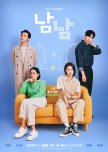
In a unique way affectionately told. Critically nuanced. Not off-the-shelf. Still easy to digest.
I might have easily missed “Not Others”, if I hadn't volunteered to help out with the German subtitling. I'm glad I didn´t miss it, because "Not Others" turned out to be an unorthodox surprise - being unexpectedly substantial and also pleasantly true to life, thus rooted in a rather simple, normal, everyday world. It is the story of a family, above all of a single mother and her daughter, but there are also a few contemporaries who are related by blood or by choice.The story goes on and on as life goes on and we go with it as a matter of course (and gladly so). (Well, at least that's how it was for me.) There was nothing particularly extraordinary and exciting about it. Just normal madness.
Well, admittedly, a bit more than normal madness... after all, the mother herself is still a teenager when she has her child and doesn't want to give up on some of the youthful pleasures in life - regardless of responsibility for the child. However, the script and the two leads find a good pitch for this very special, unusual and inherently difficult relationship dynamic with all its challenges. A clearly structured 'I'm the grown up and you're the little one' doesn´t exist. It is rather upside down here. Instead of the classic authoritarian hierarchy between parent and child, they both ended up bonding as allies sort of, in a world from which they have fallen. Due to the unusual role constellations, the arguments between mother and daughter often have a slightly funny touch. Behind this, however, lurks a rather unconscious overburdening on both sides. And this earnest approach of this emotionally tricky situation shines through again and again in the strategy of both of them trying to cope with everyday life. However, mother and daughter are overall impressing with their casual authenticity as well as pleasant directness and openness - a communication style that clearly sets them apart from so many others in the story. Choi Soo-young shines here, but especially Jeon Hye-jin, who can show herself from a completely different side in the role of the still youthful mother...).
At some point it's about a criminal case - eventually almost symbolic for the unwanted and eventually professionalized role of the daughter within the mother-daughter-relationship: the need to/the urge to look after her mother. And at some point it's also about romantic love - symbolic for the very human longing to rely on a partner on eye level, to lean on a shoulder... This human need actually concerns mother and grown-up daughter alike. But can there even be a place for 'outsiders' within the mother-daughter relationship?
Please don't take "Not Others" as a crime thriller or even as a RomCom. (The men in particular come along rather secondary...) Ultimately, it is the complicated emotional behavior patterns that characterize the family life of mother and daughter in the context of their very close and extraordinary relationship. This makes the KDrama breathe in and breathe out in its very unique pacing. It is primarily about this uncommon family, with an affectionate, yet critically nuanced look at their very special relationship dynamics. "Not Others" is cautiously questioning established (conservative) family models, too...
Overall, “Not Others” is no off-the-shelf KDrama (like so many others in 2023...).
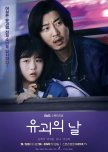
The two leads form a splendidly unique mixture, providing unique heartbeat and appeal to the story
“The Kidnapping Day” is all about its two great protagonists. I'm tempted to say: it is about the female lead character. The actress is simply wonderful and perfect for this character. Nevertheless, in my opinion, in her eccentric role she comes into her own so brilliantly precisely because her adult counterpart: the Kidnapper, who is just the way he is – as a rather clumsy person, he is practically the antithesis of this cheeky eleven-year-old but highly intelligent know-it-all. Yet, he ist the one who is sort of seeing, liberating and nurturing her usually neglected self, that is hidden underneath her intellectual brilliance: First of all she is just a child with all needs that come along. So, he might be not as smart as the little girl, yet he is actually the true grown up, who is not letting him be mislead by her genius, but watching out for her and intuitively caring for the child she is, too. This splendid mixture provides the unique heartbeat and appeal. So together they form this edgy team, keeping the audience in a good mood.The plot offers a lot of humor and quite some comicalness of the situation, but there are also serious themes lingering. After all, there is an unsolved murder case. Furthermore, it is nevertheless a case of kidnapping, even if the prefix may change over time. Added to this is the sad fact that health is often a question of money. And ultimately, behind all of this, there is also the issue of abuse. “The Kidnapping Day” is also able to tackle the ever late-breaking topic of “education hype in South Korea” in an original new way, entangling it in an exciting crime thriller.
What initially starts as kidnapping quickly takes a completely different direction. The victim becomes the mastermind. The police, or at least one of the investigators, dares to think twice and appropriately take unusual paths according this unusual case. Good and evil, black and white, its blurred. Yet, there are still unscrupulous villains. We are also stumbling over complex enmeshments, lying way back in the past.
“The Kidnapping Day” knows how to deliver on a variety of levels. Accordingly, the number of viewers has more than doubled over those 12 episodes. The special charm of the two leads also got me and I was happy to stick with them. Mind you, this was basically because of the charming relationship dynamics of the two leads, and how the two shape the kidnapping scenario along the way in a pleasantly witty way, including the solving of the murder case and at last providing a solution .
P.S.
The two protagonists, their particular relationship, THAT is the clever strength and the endearing piquancy. The rest might at times come across rather careless and pallid. Obviously, this is (once more) the product of the new era that has dawned in the KDrama orbit. Numerous new networks are now happily playing along on the market, including ENA, former SKY, which has repositioned itself in 2022 in order to get involved with its own KDrama productions in the top Pay-TV segment. (ENA belongs to Korean Telekom and produced 22 series in 2023 already.)
In general, with Disney, Netflix and others, I´d say KDrama productions feel like having doubled in 2023 (I didn't count, though). But what seems like a blessing at first sight turns out to be a bit of a sham, too. Where are all the original ideas supposed to continuously come from? And if there is a promising plot idea, it is yet far from being thoroughly worked through... Quantity rarely automatically goes hand in hand with quality. And it doesn't work the other way around either. Accordingly, “The Kidnapping Day” also suffers from the ravages of time: negligence can be observed here and there. However, the main strength and driving force of this story - the strangely lovingly developing relationship of the two unconventional leads - luckily is awesome enough to carry and equilibrate.

Soulful spot on: South Korea ranks fourth in the world when it comes to the suicide rate
According to WHO data, South Korea ranks fourth in the world when it comes to the suicide rate. (Germany ranks 42nd in comparison.) Not only stars and starlets are affected, but it runs through all sections of population. And with that, it holds up a bitterly serious, socially critical mirror to turbo-capitalist South Korea, whose tradition still places more value on appearances/make-believe than authenticity/true-being."Tomorrow" throws the spotlight on this socially problematic aspect. It is definitely a tough topic! It is based on a webtoon that enriches people's limited view by looking at the bigger picture from the perspective of the spiritual world. By providing an emotional link between the two worlds through the protagonist Choi Joon-woong, the worlds inspire each other with their insights and impulses. (After all, a wound can even heal in the afterlife...)
In short, the approach might at times seem light-footedly playful. Yet the content is profound and serious. It´s no feel-good-series. Sometimes it's fast-paced and action-packed, sometimes tongue-in-cheek, but mostly the story wants to touch, move and make you think. And it does. Overall the narrative style once again finds the right tone and the successful mix to work through the difficult, complex emotional area of conflict. Thus it is carefully, sensitively and differentiatedly illustrating the example of very different fates.
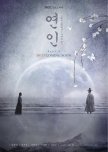
Another milestone of epic love story & a new aspirant for the hall of fame of historical KDramas
Now that another 11 episodes of the second season of “My Dearest” have come to an end, I have a couple of additional thoughts, that I would like to add to season 1.First.
In my opinion, the mission (I am here referring to the side note of my review for season 1) was a complete success in terms of the haunting dramaturgical interlinking of personal fates, love stories and a historical context, whose traumatic shadows for the national self-image extend to this day. Therefore I consider “My Dearest” as definitely belonging to the hall of fame of historical KDramas. And as a milestone of epic love stories, too.
So, on the one hand, there is the never-ending, tragic roller coaster of this fateful lovers... at times you may even become impatient that this (hopefully!) has to come to a happy ending soon, shouldn´t it? On the other hand, it is precisely because of those two significantly insignificant contemporaries and their personal context that we are cleverly torn ever deeper into the actual historical and political framework of that time. Whether we like it or not. Basically, we are of course primarily concerned with the touching dynamic between the two :-) but, nevertheless, we inevitably get closer to the dilemmas of the people, their problematic king and the political framework of that historical chapter, too... Thus, the emotional intensity of the love story kind of also serves as the cream topping for an audience, who is going all the way through this humiliating (preferably repressed) time for Joseon.
This brings me to the second:
I was positively surprised, how Confucian moral values (based on ruling authority, especially morality and loyalty) are openly pilloried in this production. Actually, the MBC KDrama production “My Dearest” from 2023 takes a pleasingly liberal stand, when it comes to a conclusion. Officially, in the narrative of the story, authoritarian values are upheld, but for the audience, this supposedly unerring path to ´order´ and ´harmony´ is clearly revealed to have failed.
It is said that the fish rots from the head down. Eventually, when it comes to such a stench, the noble, ethical-political teaching of Confucius must fail, too, if authority (embodied by the king, the teacher or the father) is weak, sick and delusional. Loyalty to a delusional king or an almost fanatical adherence to principles obviously borders on stupidity. Thus, it doesn't accomplish anything. On the contrary. Dramaturgically speaking, “My Dearest”´ haunting dynamic is driven by exactly this officially ethically legitimated, but then in fact again personally motivated 'stupidity' of some, who call themselves scholars or nobles. Practically speaking, it is about stranded traditional Confucian values… and therefore, as far as Joseon at that time is concerned, highly self-critical, too. (E.g. it is neither ONLY the Qing, to be blamed, nor ONLY the Joseon king…)
P.S.:
And as a third:
In my opinion, Ahn Eun-jin in the role of Gil-chae has really catapulted herself into a new league of acting over the course of the series - with her increasing presence, depth, authenticity and overall growing charisma. Respect! I'm definitely looking forward to further productions with her as female lead...

Epic&Bloody journey into bygone times - stately costumes, impressive landscape, elaborate details
"Kingdom" marks a new concept in the KDrama orbit. In 2019 the cine drama was born. This describes a kind of hybrid production with film studios being involved in drama series and movie directors hired for the production. Cinematic camera therefore has since then become characteristic. "Kingdom" was the first original Netflix KDrama production and is thus repeatedly mentioned as a pioneer in this cine drama genre."Kingdom" is an impressive, idiosyncratic mix of colourful historical drama and bloody zombie thriller.
In the broadest sense, the story relates to the so-called Imjin War, the Japanese invasion between 1592 and 1598.
--------------- SIDE NOTE: History meets fiction
The KDrama specifically (but losely) refers to the Battle of Sangju (1592) in the Upo Wetlands. At that time General Yi Il had the problem that he only had a cavalry of 60 soldiers while he was supposed to stop the Japanese on their advance from Busan to Hanseomg. However, his assigned company, which was supposedly equipped and trained first-class, did actually not exist or was not operational. Either the original soldiers were sick, dead, or gone. The local garrisons were also empty because the soldiers stationed there had been recalled to Daegu. What he got were untrained civilians. With the grain he found in a warehouse, he was at least able to recruit some of them. However, he no longer had time to prepare the ca. 900 commoners for the battle, because the Japanese were already there.
The KDrama picks up on this moment in Korean history and rewrites the story in a zombi spirit: In that desperate battle, the former governor of the southern Chungcheong province, Ahn Hyeon, ultimately took command and led around 500 Koreans against an overpowering army of around 30,000 Japanese. The Koreans were victorious thanks to an unknown "resurrection plant" that can be used to resurrect the deceased as bloodthirsty zombies and, with a little skill, can be used as weapons. So (at least in KDrama) the battle in the wetlands could still be won.
------------------------------------------------------------
Otherwise, the historical setting provides the hook for an epic journey into bygone times with stately costumes and impressive (authentic South Korean) landscape shots, elaborate details and bloodthirsty butchery. (As adult Netflix production this KDrama is exceptionally brutal). The zombies, with their horde-like appearance and yet very idiosyncratic "fighting style", provide a change from the classic battle formations and martial art sword fights, causing a real challenge for the experienced generals as the opponents are already dead... It requires intelligence, creativity and, above all, high speed. The story itself progresses at this high pace. Neverthelss the emotionally essential scenes have been captured in the proven KDrama style: slowly, intimately and with maximum intensity.
As so often it is just a few powerful, scheming people who make life difficult or even impossible for the many. Yet, not only these political intrigues are the driving force of this thriller. First and foremost it is the question about the epidemic origin and how it might be defeated.
Answers to this question require a second season, even a KMovie and most probably a third season, too. Additionally another film spin-off is being planned. Obviously the story about the "resurrection plant" is far from being told.
... and I am ready to set out again with the noble crown prince to find a solution to save his people and the future of his country in the face of this locust-like zombie plague. Thrilling.
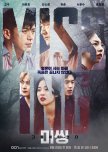
Compelling, grounded in substance, and gratifyingly true-to-life. With a wonderful basic premise
"Missing: The Other Side" seems a bit like a KDrama with a magic hat. The story has the similar effect as the theme of the production: it sort of cavorts in a veiled intermediate world. It could simply be missed out. If you are looking for something in the field of fantasy, the KDrama does not impose itself. It's not fantastic or psychic enough. If you're looking for a thriller, you're more likely to scroll past it. It's not a psychological thriller. It's also not a classic crime thriller. So it seems ... And yet. "Missing: The Other Side" is extremely well done and definitely recommendable. I wouldn´t call the KDrama fantasy or mystery, but rather solid crime genre, in which actually time and space become relative... If only I had known earlier...The KDrama is like an insider tip - although it´s success is not a secret. On the contrary. A second season will come out soon. The story is compelling, grounded in substance, and gratifyingly true-to-life beyond the basic premise. "Missing: The Other Side" doesn't entice viewers with a cast full of dazzling names, but with a fascinating, extraordinary production. A class of its own. The concept thrives on straight simplicity.
There is the radiant simplicity of the brilliant underlying idea: a tribute to the missing. There are actually too many missing people in South Korea - children and women in particular. In more than half of the cases, the missing person is at some point found dead - most of the time several years later. The idea of the KDrama particularly honors those victims by creating a kind of dignified in-between-world for the time during investigation, how long it may ever take. Only then, as their corpse is found, they will part in peace. In the meantime, from the minute the missing person dies until the moment the corpse is found, those souls linger in a beautiful and (mainly) peaceful village among other fellows with similar history. There is a certain charm to respectfully giving such unsolved cases some faces, individual stories, soul, hope & heart - some friendly, reminding space. Even though many missing people´s cases get closed and quite a few may remain unsolved, the KDrama respectfully opens a door to connecting to them.
Granted, the living and the dead share the stage equally. Yet there are no mouldering, half-decayed or slightly moldy ghosts buzzing around. If you like, the idea of "Hotel del Luna" is varied in a less exalted ambience, a little more down-to-earth and less spooky. However, if "Hotel del Luna" was cast with dazzling superstars, "Missing: The Other Side" consistently maintains the simplicity of its concept. Very few KFans will end up following in the footsteps of their 'stars' in this KDrama, they aren't so well known enough outside of South Korea for that. Nevertheless, they all do a splendid job.
Finding the corpses of the missing however requires the living and their down-to-earth investigative work. The knowledge of the deceased can be used. Eventually, there is a catch: it requires living people who happen to be able to SEE and communicate with the dead. The worlds 'here' and 'in between' do overlap in the village of Duon, but only for those with the special gift of perception. A loose team sort of gets thrown together by fate and begins to work more or less jointly to solve some cases that are apparently related in some way. Everyone has to carry some personal luggage, in which missing people play a significant role. One is a crook, his colleague is a hacker, another protagonist works as a detective, another is a widower and father who, even after many years, has not given up the search for his missing daughter.
If you can/want to accept the basic premise of that in-between world, then "Missing: The Other Side" offers an all-round gripping crime thriller. Without any ribbons, but with warm heart. Not highly polished, but atmospheric and impressive. The protagonists are quite three dimensional - no superheroes, but rather ordinary, authentic, tangible. It could be anyone. Lastly, this story would especially happen in South Korea, because in this KDrama the ever so characteristic orphanages and Jaebeol once again got leading roles within the dramaturgical structure.
In case you are not sure, if you should watch, here my advice: Don´t miss "Missing: The Other Side".

Outstanding! A KDrama that somehow satisfyingly feeds the human heart.
The KDrama "Our Blues" unfolds a distinctive magic that gently stretches its silken net around the hearts of the viewers and thus spreads warmth. Big KDrama!Re. musical genre: the blues is a kind of lament, sad in nature and born of pain. In "Our Blues" it's not the lamentations of slaves on the plantations, but those of several very average people living where South Koreans prefer to go for vacation: Jeju Island. The protagonists´ lifes are in no way spectacular. They are rather normal for their age and the place. They work hard for their income, live simply and often on what the land (and in this case the sea) offers them. From the buzz of these individual and yet so normal lamentations, a sense of unity grows, that even transcends the screen - because many can sympathize with it and identify with their painful and often humiliating experiences in their own way. That makes it "OUR" blues in several ways. It reaches out from the world of the KDrama into the world of the audience and brings us as people from all over the world a bit closer to each other.
"Our Blues" fondly tells a dozen stories about disappointments and unhealed mental wounds that many people know in one way or another and may have experienced themselves. Most of the protagonists (all wonderful first-class cast!) have known each other more or less since childhood. They form a community of colleagues, friends, family and family of choice. Although Jeju-do is South Korea's largest island, it is relatively small at 73 km x 31 km. At its center, South Korea's highest mountain - the dormant Hallasan Volcano - divides the island into the northern area around the city of Jeju and the southern area around the city of Seogwipo. Seogwipo has an urban center with the harbor and then there is urban sprawl with village structures along the coast. This city characterizes the living environment of the characters. As audience, we accompany some of them in a kind of latent mental process of molting.
Some say there is no such thing as a storyline in "Our Blues". In fact, it is more of a composition, or rather a kaleidoscope of independent lamentations. At the core of each lies an ancient pain. What's magnificent about "Our Blues" is that (and how) these songs are finally being sung and thus make space for light and love. For far too long, the protagonists have kept their pain deeply hidden within. They tried to live with it neatly packed away, instead of 'giving' it some space. Yet, sooner or later, the old pain just 'takes' its space... for 20 episodes...
I would´t call it healing, rather transformation, because the painful experience of the past is and remains what it was. However, the potential of what is possible in the future is changing. When the pain in the heart is finally allowed to find space and show itself, it can be witnessed and receive the recognition it deserves. The spasm dissolves and energy is released. Thus new experiences are now possible in the future.
Wanting to spare oneself or others, or wanting to avoid conflict and confrontation, has ultimately never really worked or done any good. Actually, emotional pain and psychological suffering have something to offer: they are the key to opening a portal to a new dimension of truthfulness. The recipe is quite simple: friction (in a deliberately tangible sense of rubbing) facilitates closeness. The problem that prevents this potential for closeness is very human: fear. Because the prerequisite is that I have to honestly show myself as I am (e.g. with my feelings). In doing so, I make myself vulnerable. But only then someone dear to me can reach out and touch me for real. And only in this way true encounter between me and the world becomes possible. Self-assured. Aware of myself. Straightforward. Straight. Upright.
In this KDrama lamentations are ´sung´ and ´heard´. Deep down they are sad, true enough. Yet, it makes you happy, that they are sung at last. And it is just beautiful the way those stories are told: The variety of stories about friendship dynamics, unrequited love and sensitive family relationships are affectionately interwoven in many layers and gain in radiance. We repeatedly encounter individual protagonists in several contexts. One person after the other ... we can´t help to grow fond of them. Ultimately, besides the very human blues that life inevitably offers as a portal to become who we are, the constants in all time, here, there and everywhere, are the sea around us and the sky above. Jeju-do as location for this KDama just hits the spot!
A KDrama that somehow satisfyingly feeds the human heart.
(By the way: "Our Blues" has become one of the highest-rated series on South Korean cable television. Viewer ratings have doubled from episode 1 to 20. (As I said, you grow fond of it over time...)
----------------- SIDE NOTE: --- Haenyeo = sea women or daughters of the sea ---
Jeju-do is famous not only as a tourist hotspot with boardwalks and hotels for honeymooners (Jeju International Airport is the third largest in the country), but also for its volcanic landscape, which is now a World Heritage Site. Yet, furthermore, characteristic of the island's tradition are the Haenyeos, who have been diving for centuries without oxygen tanks for abalone (or sea snails) and other sea food. Especially abalone is plentiful on the seabed around the island. However, these are not so easy to harvest by conventional fishing industry.
To this day, the archaic way of free diving is the only proven one: hold your breath, dive down with a hook, a weight belt and a small net, and then skilfully scrape the seafood off the rocks at the bottom. Today, wetsuits, diving goggles and fins help. A buoy marks the 'area'. Not everyone can do that. Apparently women are particularly good at it. Often families practice this craft for many generations already. The technique of holding your breath for around 3 minutes at high underwater pressure, even at a water temperature of 8 °C, is usually passed on to the daughter. (Actually, in these circles the birth of a daughter is finally empathically praised and extensively celebrated.)
The income of the sought-after Haenyeo has become quite respectable. They are economically independent by now. These days, however, there is shadow to it, too. Being able to finance university studies for their offspring, the young generation nowadays prefers to move to the mainland for higher education and more comfortable jobs. Accordingly, the Haenyeos could soon become extinct. Nevertheless, once you are a Haenyeo, you stay with the diving until old age.
----------------------------------------------------------------------------------------------------

Fun. Touching. Plus light-heartedly questioning the matter of course of human interaction
"The Legend of the Blue Sea" refers to a very old Korean legend that originally tells the lovestory between a mermaid and a fisherman. However, the KDrama is just loosely based on this fairy tale.In the rich Korean folklore of "Imuldam" (mostly oral shamanic songs, myths, fairy tales and folk tales) which is still very much alive today, there are frequently supernatural beings that move around in the earthly dimension - whether mermaids, a nine-tailed fox, a Goblin, or other spirits. These "Imuldam" are particularly inspired by shamanism and Buddhism. KDramas repeatedly pick up motifs from this tradition and find contemporary ways to keep them alive and reinterpret them. The special attraction arises from the fact that our human world receives a different value, appreciation and perspective through the eyes of those non-human creatures less influenced by time and space.
"The Legend of the Blue Sea" is based on a mermaid caught in a net by a fisherman in the early Joseon era. Then he fell in love with her. However, mermaids rarely feature in Korean folklore otherwise. The topic makes a nice link to western tradition and that's probably how it was intended. Also, parts of the KDrama play outside of South Korea - in Spain.
At the same time, the story takes up another, widespread and popular motif in KDrama orbit: reincarnation. Most of the time it is about souls that were not able to complete certain experiences in the past and are confronted with these or similar situations again in their present incarnation - in order to do things better or differently. In "The Legend of the Blue Sea", the historical fairy tale from back then and its version, transposed into the present day, are developed in parallel in two narrative threads. Just as the protagonist (and also another character) slowly (again) remember their past life, we, too, experience what really happened back then. Eventually the question arises whether life must necessarily repeat itself or else other decisions could be made.
Actress Jun Ji-hyun obviously enjoys her character as a humorous, mischievous mermaid, innocently and ignorantly experiencing the modern human world. With her performance she definitely jazzes the story up. Her sometimes almost naive trust, which is a bit reminiscent of a puppy in places, stands in warming contrast to the distanced, calculating coolness of her Jack of Hearts in 2017. The picture is completed by - here and there - being able to look back into their Joseon past, where he rather personifies an amorous, honorable nobleman.
Ultimately, this KDrama offers a well-designed dramaturgical variety of telling an enchanting love story in two different ways - and at the same time (with a twinkle of an eye) questioning the matter of course of human habits and interaction.
It´s fun and touching.

Wake up in the midst of sobering contemporary everyday life issues of 3 women in their 30s and 1 man
With "Work Later, Drink Now", KDrama tackles a sensitive South Korean social issue. What starts as a cheerful, cool FeelGood series turns out to be serious business. Viewers are taken by the hand in a clever, light-hearted way, only to wake up suddenly in the midst of sobering contemporary topics, as we accompany the protagonists in their everyday life, work, family and friendship issues - here in particular: three unique young women in their 30s and one offbeat man.The KDrama points at a topic in which South Korea (though small as it may seem) is once again at the forefront of the world: alcohol consumption. There is so much drinking (and eating, because it's so common) on this show that just watching it can make you dizzy and a little nauseous. To the western eye, that may be WAY too much over the limit. For the Korean eye, it might have to be be sooo much for the audience to even notice that it is/could be too much.
The focus of the story is on three girlfriends in their prime who are hard-drinking and happy to drink. With their personality, they may at first glance be a little off the norm, but then again they aren't. They are (from each other) fundamentally different in their professional situations, socialization and life plans. But it is precisely in this way that they also offer viewers all kinds a sophisticated projection while following each one of them in their everyday life and various challenges they face. The dialogues are razor-sharp, the entertainment high value, the episodes compact. There's also wit, humor and music. This mixture plus the pace are obviously just right to pick up the broad masses of +/- 20 to 40 year olds and to present a mirror of their own living environment in an easily digestible way. The second season will definitely come...
------------ SIDE NOTE: --- Alcohol consumption in South Korea ---
Per capita consumption of converted pure alcohol in South Korea is world class. And rising. The World Health Organization certifies South Korea to be the leading country in the consumption of high-proof spirits. Drinking has established itself outside of private life, especially professionally at company dinners after work. These team dinners often degenerate into a veritable drinking spree (practically prescribed professionally).
After beer, soju is the second most consumed alcoholic drink - a colorless distillate made from rice and added wheat, sweet potatoes or barley, which is on the one hand quite cheap in price and on the other hand, at around 20 percent, is somewhere between beer and high-proof spirits (schnapps, vodka, rum or whiskey ) is located. So it can be consumed in large quantities, especially in combination with beer - and the hangover the next morning is inevitable. South Korea's national drink, soju, is the world's best-selling 'liquor' with around 90 million cases sold each year. Yet, the beer market is also happy about South Korea, which, (in spite of its comparatively small country size) is currently one of the largest and most dynamically growing beer markets on the Asian continent.
What begins as party fun usually ends sadly. In the short term, it may be a hangover. But if you practice this form of alcohol consumption at a high level over a long period of time, the damage to your physical health is enormous in the medium to long term. There are studies that show that even among South Korean students (male), every third (!) drinks to the point of unconsciousness (!) for more than half the week. It doesn't get any better in professional life. And if you don't have a job, there's another reason to get drunk. This has inevitable consequences not only for people and their physical/mental health, but also for the health system. The country pays the price of an enormous pressure to perform taken granted in the context of its own turbo capitalism - with the health of its population and moneywise with billions, too .
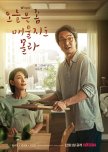
A true enrichment for the KDrama Orbit.
"Recipe for Farewell" is about food for body and soul. About the health-promoting function of food. A meal prepared with care and love may have this function - even in the paradoxical situation where eating is actually no longer possible: in the final stage of cancer in the gastrointestinal tract.As the story is also about cancer, surprising enough this KDrama is not primarily about dramatically approaching the inevitable death. Eventually, sorrow, fear and decay are not neglected, yet the focus is on joy and pleasure in sensual enjoyment of a freshly and carefully prepared meal. It is about the time you share over a meal. About this deliberately sensory, genuine here and now time together. A good, unforgettable time.
In this KDrama two quite opposing moods harmoniously go hand in hand. Death, pain and farewell may hang about. However, life and the joy of it are not overshadowed by impending death. In fact, "Recipe for Farewell" is not gloomy or heavy. Rather, it emits somehow velvety-silky, comfortably warm rays of light whenever it threatens to get dark and in spite of sadness.
In KDrama there is always eating and drinking at some point. Now that's not special. But in "Recipe for Farewell" everything to do with (Korean) food is intelligently, sensitively, carefully, sensually and lovingly mixed in a stylish way. Eating becomes an explicit topic - from the carefully chosen recipe, mindful purchase and loving preparation to conscious consumption. Each episode is named after a Korean dish. You can learn a lot if you like. In any case it is enjoyable to watch - aesthetic, stimulating, inspiring.
Apart from recipes and the preparation of the dishes, the story draws attention to the essence of food: to the radiance that passes from food to soul. To the joy of being alive. To the gift of being part of this eternal process of transformation that is life: From seed to flower, fruit, leaf, root, color, smell, touch, taste, temperature, liquefaction, finally compost, gases... and dissolved into air.
The story is based on an autobiography of the same name. In it, author Kang Chang-Rae describes how by cooking for his terminally ill wife he actually started cooking from scratch. And that triggered quite a bit - within himself and people around him, too. "Recipe for Farewell" doesn´t aim for your heart. It goes even deeper and reaches out to your gut. This is about ´true and sound´. The characteristic gaze of the protagonist, who is deliberately focused on his job as a chef in the home kitchen, is rather simple and objective. Eventually, by unpretentiously doing his job, their flows dynamic new life within the relationships with his ex-wife and his son, too.
Eating together - the meal - becomes the symbol of the truce of all worldly disturbing topics and opens the way to community -> connection -> bonding -> closeness ... by sharing space, time and the (eating) joy, to be alive (= to be able to see, smell, taste and digest).
The original idea is based on an impulse, that came from his ex-wife, when she actively asked him to cook for her during this last few months - and thus be and remain there for their son (who lives with her) when she can no longer. She wishes for peace between father and son, at the latest when she is gone.
Such a final farewell process may be painful for everyone. The disease itself may be painful. This is acknowledged by this KDrama. Yet, the focus is rather on the shared time together when the mother, father and son feel GOOD with one another. "Recipe for Farewell" truly presents a wonderful recipe for saying goodbye - loving, calm, grounded, with simple, three-dimensional sincerity and warmth. Leaving father, son and audience - although sad as it may be at times - with a positive, thankful outlook on life.
"Recipe for Farewell" runs on the South Korean streaming provider Watcha and is very popular there. The series may even trump the acclaimed production "Semantic Error". In any case, the number of paying subscribers noticeably increased during first week of broadcasting... And in the Watchapedia app, the KDrama is ranked 1st among 190 series from 2022 with 4.5 out of 5 possible points in the viewer rating. I agree. Pretty much everything is done right here. The actors are doing a fantastic job, too!
A true enrichment for the KDrama Orbit.

Where it is particularly dark, even a tiny little bit of light appears immensely bright...
I ended my review about the first seasons with the conclusion: "I only recommend "The Escape of the Seven" if the mood is right - one that demands unfathomable beastliness down to the blood. If we get involved in this KDrama, then we will uncompromisingly be catapulted into a world in which a search for the good guys could very well be in vain..."And obviously, things can always get even worse. At the same time, a wink of a conscience is actually making itself known here and there… very quietly, though. Regret and shame become concepts that are though stumbling trying to make themselves be heard. It's evidently not that easy, but maybe, who knows, it might not be impossible…
Still, the Seven can't easily get out of their skin. It´s way too serious what they had done and must be held accountable for. Even if they all go through their own processes and would perhaps like to choose a new path in some way (fortunately, people have the potential for healing and transformation), they can neither run away nor undo what has happened. In addition, they have made a pact with the devil... No matter which devil you get involved with, it rarely goes well...
The second season cleverly manages to build on the first one with fresh dynamics, while still giving the emotional rollercoaster ride a new direction. Sophisticated dramaturgical twists included. It's amazing to notice ourselves suddenly sympathizing with one or the other of the loathsome Seven...
In addition, the KDrama is vividly displaying the frighteningly diabolical (not too distant) future scenarios of our increasingly digitally depending information society, that in the worst case scenario, could become completely helpless in its interconnectedness...
Overall, I think “Escape of the Seven” is even winning with its second season. It offers a special KDrama experience that has it all - for all those who don't shy away from the abysm of the human species. And as is well known, where it is particularly dark, even a tiny little bit of light appears immensely bright...

Sophisticated genre mix. Soulful. Well grounded. At a comfortable pace.
With "My Perfect Stranger" KBS has succeeded in creating a sophisticated genre mix: there is a complex crime thriller that is excitingly intertwined across time and space, colored with its ultimately opaque interdependencies. There is charming time-travel with the chance to heal emotionally troubled family relationships and with the distinctive complexion of the late 1980s in the transition from dictatorship to democracy. There is also the pointed coming-of-age of the protagonist's parents and their classmates of that time. At last, even a (though rather tender, cautious) love story emerges out of the common fate of the two time travelers.The KDrama thus is presenting (in my opinion) a thorough emotional variety, which has a lot to offer from suspense to amusement an even romantic vibes. So all of this comes rather casually. Well grounded. At a comfortable pace. With feeling, especially around the diverse family dynamics, which are allowed to take their distinct twists and turns from the different perspectives of time and space.
A coherent, harmonious KDrama experience. Worthwhile.

Captivating. Cinematic. Action-packed, yet offering impressive quiet & heartwarming tuning, too
Gando is the land of the desperate, the realm of the desperados of Joseon. In the 1920s, it was also a territory in which political responsibilities and affiliations were vaguely regulated. Some things may remind you of the Wild West. Yet this Wild North in the Far East is quite different...“Song of the Bandits” is a brilliant Netflix historical drama about a certain chapter of recent Korean history. Moving. Captivating. Cinematic. It exudes the vibes of an Eastern. The KDrama surely is gory action and turbulence at most times, but offers impressive quiet and heartwarming tuning, too. Action-packed it is, yet humor and romance modestly fit in as well. "Song of the Bandits" is astonishingly well balanced in this respect and for a Netflix production, despite its polished and action-driven choreography for a broad international audience, sticks surprisingly consistently to a more subtle Korean series style. Nicely done at all scales. We get a feeling of the Manchurian landscape with Gando impressions filmed at original locations. This all framed within a consistently beautiful soundtrack. It all lasts for 9 episodes (only! Yet?). In spite the overall ambitious commercial production context, aiming at an international “Squid Game”-like success, “Song of the Bandits” was able to impress me with a historically and emotionally complex story with great mimes - Kim Nam-gil, Yoo Jae-myung, Lee Ho-jung and Lee Hyun-wook in their element. But so is everyone else. This is where KDrama and Netflix perfectly come together...
'Bandit: The Song of the Sword' is the original title. In fact, people don't swing swords so much as they use firearms. The KDrama is epically processed, offers great emotions, while telling about people and the range of motives for which people are prepared to fight. It's about resistance, obedience, venality, oppression, social affiliation, the fight for freedom. There are even some spiritual thoughts attached to it along the way. It is about the Joseon people, some personal fate, as well as 'the' history of Chosen - an emotionally quite ´Korean´ excerpt of modern history. Its thematic historic setting (even if the rest of the world might not care so much about it, as it is not requisite for an entertaining series pleasure) contains a lot of explosive material by Korean standards. Therefore firearms are in several respects quite consistent in this context…
As far as I am concerned, I do care about the historical context. On the contrary, I find it quite intriguing - besides the dramaturgically action-packed and emotionally charged story with its complex, interwoven relationship dynamics and conflicts. As I said, you don't really need to know the background to be enthusiastic about "Song of the Bandits". But if anyone might be interested, see the historical side note about 'Gando', the border region on the north bank of the Tumen river, which today also marks the border between northeast China and North Korea.
PS:
Yep, the ending of the story...
If you like, you can dream of more. It could be possible. Yet, it would still go on and on.
Who knows if there may be a sequel...
Nevertheless, from my perspective the ending is quite fitting. (Whether I like it or not.) In terms of the historical events, things are as they are. We want fiction to write a different ending, but it still wouldn´t be any better, rosier or brighter for hardly any of the various protagonists... Therefore, from a Korean perspective the ending of this story remains true to the spirit of the actual Chosen-history: For Joseon people it is and remains unsatisfactory, unfair and painful. ´We´, as an international audience (temporarily and figuratively with our personal discontent), can/shall/must/may thus empathically share this collective emotion, too.
-----------------------------------------------------------------------
SIDE NOTE: --- Gando, also called Jiandao, and today Yanbian ---
Gando historically stands for a specific borderland. To this day it is a region with a high proportion of people of Korean origin.
Gando is a small, perhaps inconspicuous scar in Korean history – yet a scar that is still weeping, sort of...
Gando (and Manchuria in general) is also associated with the regrouping of the Rightous Army and thus with the patriotic pride of resistance against colonial oppression. With "Song of the Bandits", the issue of Gando has now obtained an impressive, international onstage introduction...
This 'Gando', Jiandao or Yanbian was the last nail of hope for an increasing number of desperate people from Joseon (and still is for some North Koreans today) who had nothing to lose and would rather settle for an arduous life and try their luck in this section of Manchuria - a back then relatively undeveloped marshland on the north bank of the Tumen river.
First - in the course of, and especially at the end of, the 19th century - famine and poverty drove poor Joseon people to the far north. Then, at the beginning of the 20th century, it was the hope to escape from Chosen, which was finally officially annexed by the Japanese. The Righteous Army militia was also formed anew in Manchuria at that time.
After the annexation of Joseon, with respect to a relatively large population of Joseon people, the Japanese as part of their aggressive expansion efforts also demanded this coastal territory north of the Tumen from the Chinese. Infiltration was followed by an invasion in 1907, but already by 1909 there was withdrawal again. Officially, as a result of the diplomatic negotiations, the area eventually became Chinese again and Japan received railroad concessions, while the Joseon people remained under Japanese rule due to their Korean descent.
"Song of the Bandits" sets its story in this political quagmire: the decade before the belligerent 1930s, before the Empire of Japan invaded Manchuria, established the puppet state 'Mandschukuo' and used it for its own political and economic purposes. The prerequisite for this was a massive expansion of railway lines - especially the North Chosen Line along the border region between Chosen and Manchuria, that had been built during those previous years, while the Bandits sang their song...
Outlook:
After the end of the Second World War, many Koreans went back to their homeland, but by no means all of them. Around 810,000 people of Korean origin apparently still live in the Yanbian Autonomous District of China's Jilin Province to this day. In 1952, the proportion of the population with a Korean migrant background was around 60 percent. Then, Korean language was official. However, especially since the late 1990s, the Chinese government had specifically tried to force linguistic and cultural assimilation in order to counteract political currents in South Korea and discussions about a possible legitimate Korean claim to 'Gando'. These currents believe that - regarding those dubious events of the early 20th century and Gando Convention between Japan and China becoming obsolete with the ending of the World War II – this Gando territory actually is political void and should now belong to (in this case North?) Korea. Thus, Gando's territorial status for some still is not satisfactorily resolved…
Incidentally, desperate North Korean refugees are continuously trying to get to China via the Tumen river, which is icy during the long, cold winter months. Thus, Gando territory invariably remains a last nail of hope for desperate Koreans even up until today...


 9
9 39
39 15
15















